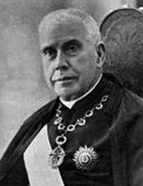

He was also a man of political and social action. Until the coming of the Republic he was a militant in the Progressive Party, where he became a member of the executive committee, jubilantly celebrating their victories. He was an admirer of Sidónio Pais (at the time of the review of the separation of Church and State) and played a decisive role in local politics related to the “the 28th of May” in the opinion of Belisário Pimenta. He was a member of the District Committee of Coimbra, and there are notable traces to be found in the existing documentation of his path through this important administrative body. He was secretary of the Misericórdia of Coimbra, he reorganized the Confraria da Rainha Santa Isabel (Brotherhood of the Holy Queen Isabel), the patron saint of Coimbra, and “was the soul behind the foundation” of its Women’s Refuge in 1930. The setting up of the Faculty of Letters and the construction of its first building owes much to his dynamism and influence when he was its first Dean (1911-1920). He was also the organizer of the University Archive from 1897 on and its first director after it became an independent division of the general secretariat (1902-1927). He held the post of director of the University Chapel for several years, almost until the coming of the Republic, which allowed him to preserve many of the chapel’s religious objects and adornments in the Museum of Art, which he was able to transform and annex to the Archive after the 5th October revolution. He was the Reitor (Head) of the Coimbra liceu (high school) where he was part of the examinations jury, establishing a reputation as a demanding examiner, as António Sardinha found out in July 1906 when he sought some indulgence through the mediator, Eugénio de Castro. He collaborated on various reviews and newspapers, especially and assiduously on the Correio de Coimbra, the diocese’s paper, and on O Instituto, of which he even became part of the editorial board.
At the time of his training and when he began as a teacher, the Faculty of Theology was going through a grey period in its history – it was in conflict with the Bishop, there were only a few students attending at a time of anticlericalism and there were no theoretical theologians as some of them leant, maybe for these very reasons, more towards historical and philological studies. It was here though that António Vasconcelos, already with a propensity for historical studies when he was at high school, worked as a history teacher and researcher, later continuing at the Faculty of Letters (1911) when his first school was closed. Here he exerted a decisive influence until he retired in 1930 – a moment when new directions for historiography were being inaugurated in France – an influence that lasted even after his death in 1941.
